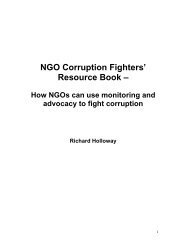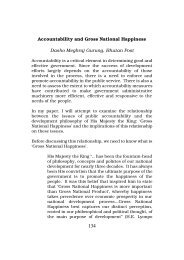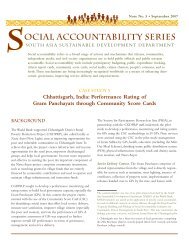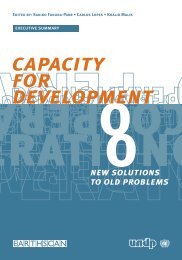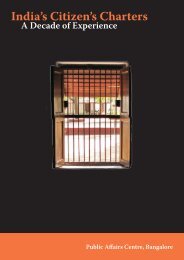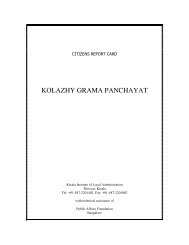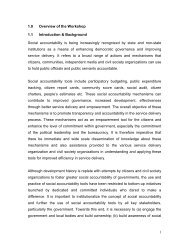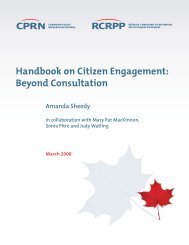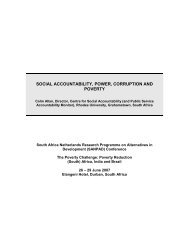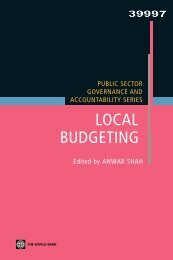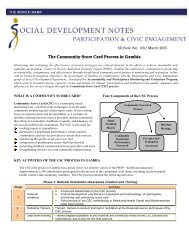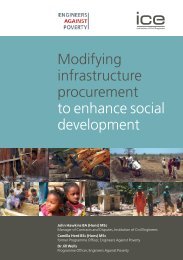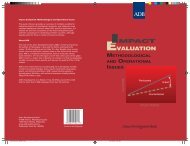Enabling Environment for Social Accountability in ... - SASANet
Enabling Environment for Social Accountability in ... - SASANet
Enabling Environment for Social Accountability in ... - SASANet
You also want an ePaper? Increase the reach of your titles
YUMPU automatically turns print PDFs into web optimized ePapers that Google loves.
department unchecked authority to provide or deny access to <strong>in</strong><strong>for</strong>mation and may, thus, arbitrarily<br />
obstruct access to <strong>in</strong><strong>for</strong>mation. 43<br />
The wide range and ambiguous content of the legal code effectively allow <strong>in</strong>dividual bureaucracies to<br />
def<strong>in</strong>e their own rules, lead<strong>in</strong>g to an extensive classification of documents. Dur<strong>in</strong>g both <strong>in</strong>terviews and<br />
focus groups, CSO leaders and journalists repeatedly compla<strong>in</strong>ed that too many government documents<br />
are classified. In a welcome development, however, the government made a commitment <strong>in</strong> 2005 to<br />
revoke the Law on Secrets <strong>in</strong> its Ten Steps to Intensity the Implementation of the National Program to<br />
Combat Corruption. Un<strong>for</strong>tunately, dur<strong>in</strong>g the study’s dissem<strong>in</strong>ation <strong>in</strong> February 2006 opposition leaders<br />
called <strong>in</strong>to question the government’s commitment to re<strong>for</strong>m<strong>in</strong>g the secrecy laws. A prom<strong>in</strong>ent opposition<br />
MP <strong>in</strong>dicated that “there is no talk yet of modify<strong>in</strong>g [the laws on secrecy] either with<strong>in</strong> the government or<br />
among the MPs.” Another MP from a different opposition party <strong>in</strong>dicated that “there might be some<br />
struggles <strong>for</strong> (reta<strong>in</strong><strong>in</strong>g) the secrecy laws.” When a representative of the M<strong>in</strong>istry of Justice and Home<br />
Affairs was asked to comment; he responded that this was not with<strong>in</strong> their preview but the responsibility<br />
of the State Intelligence Agency.<br />
Poor accessibility of <strong>in</strong><strong>for</strong>mation characterizes the Mongolian legislative process as well (F<strong>in</strong>d<strong>in</strong>g 3.3.2).<br />
Dur<strong>in</strong>g an <strong>in</strong>terview <strong>in</strong> February 2005, an MP cited a proposal <strong>for</strong> mandatory publiciz<strong>in</strong>g of all bills to be<br />
considered <strong>in</strong> parliament at least 30 days be<strong>for</strong>e they are put to a vote. Dur<strong>in</strong>g this period, citizens have<br />
the right to evaluate the bill and voice concerns. However, the provision was revised to read that bills can<br />
be publicized; consequently very few are. The MP attributed the revision to the socialist legacy of state<br />
secrecy but asserted that “the soil is now ready” to change this practice and other legalities that h<strong>in</strong>der<br />
CSO civic engagement and social accountability.<br />
Access to parliamentary deliberations is also limited, so that citizens rarely attend parliamentary sessions<br />
and stand<strong>in</strong>g committee meet<strong>in</strong>gs. Citizens are permitted no more than 15 m<strong>in</strong>utes to observe sessions of<br />
the State Great Khural; and m<strong>in</strong>utes from the sessions are not easily accessible to the public. It is<br />
there<strong>for</strong>e difficult, if not impossible, <strong>for</strong> citizens to evaluate the per<strong>for</strong>mance of their representatives or<br />
monitor the legislative process, <strong>in</strong>clud<strong>in</strong>g budget allocations.<br />
To address this issue, The Asia Foundation (TAF) funded a project <strong>in</strong> the mid-1990s to publish multiple<br />
copies of parliamentary debates <strong>for</strong> the public record and to deliver them to various public access<br />
libraries. One of these depositories was the UB headquarters of Women <strong>for</strong> <strong>Social</strong> Progress, which also<br />
ga<strong>in</strong>ed live television access to parliamentary debates (see box 3.3.1). After TAF fund<strong>in</strong>g ran out, the<br />
GoM cont<strong>in</strong>ued to publish and distribute parliamentary deliberations, as had been previously agreed upon<br />
with TAF, but soon stopped, cit<strong>in</strong>g budgetary reasons. Currently, the only copy of the m<strong>in</strong>utes from<br />
recent parliamentary debates is <strong>in</strong> the archives of the State Great Khural. The general public has a legal<br />
right to access these archives, but many people are unaware of this or are unable to travel to UB to consult<br />
the documents. 44<br />
43 .A survey by Globe International (2003) reports that out of the 47 government agencies surveyed, only 32 had produced a list of<br />
secrets; and 33, a procedure <strong>for</strong> classify<strong>in</strong>g documents as secret, <strong>in</strong>dicat<strong>in</strong>g that many agencies have not fulfilled the legal<br />
requirements to establish their own secrecy regime. Of the agencies that are comply<strong>in</strong>g, 23 considered the lists and procedures,<br />
themselves, to be secret.<br />
44 The UNDP also allegedly attempted to undertake a project to promote public parliamentary hear<strong>in</strong>gs, but there was some<br />
political resistance, so it was never implemented.



